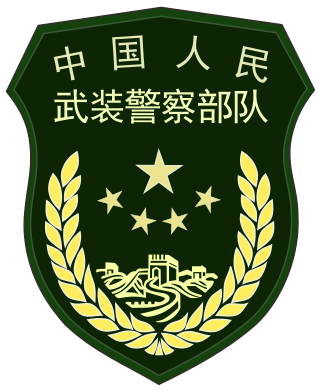Public security is the prevention of and protection from events that could endanger the safety and security of the public from significant danger, injury, or property damage.
Public security may also refer to:

The Chinese People's Armed Police Force is a Chinese paramilitary organization primarily responsible for internal security, riot control, counter-terrorism, disaster response, law enforcement and maritime rights protection as well as providing support to the People's Liberation Army (PLA) during wartime.

Secret police are police, intelligence, or security agencies that engage in covert operations against a government's political, religious, or social opponents and dissidents. Secret police organizations are characteristic of authoritarian and totalitarian regimes. They protect the political power of a dictator or regime and often operate outside the law to repress dissidents and weaken political opposition, frequently using violence. They may enjoy legal sanction to hold and charge suspects without ever identifying their organization.

Law enforcement in China consists of an extensive public security system and a variety of enforcement procedures used to maintain order in the country. Along with the courts and procuratorates, the country's judicial and public security agencies include the Ministry of Public Security (MPS) and the Ministry of State Security (MSS), with their descending hierarchy of departments, bureaus, subbureaus, and stations.

The Ministry of Public Security is a government ministry of the People's Republic of China responsible for public and political security. It oversees more than 1.9 million of the country's law enforcement officers and as such the vast majority of the People's Police. The MPS is a nationwide police force; however, counterintelligence and political security of the Chinese Communist Party remain core functions.
A security agency is a governmental organization that conducts intelligence activities for the internal security of a nation. They are the domestic cousins of foreign intelligence agencies, and typically conduct counterintelligence to thwart other countries' foreign intelligence efforts.

The University of International Relations is a national public university in Beijing, China. It is known colloquially as "Guoguan" (国关; Guó Gūan).

The Ministry of State Security is the principal civilian intelligence, security and secret police agency of the People's Republic of China, responsible for foreign intelligence, counterintelligence, and political security of the Chinese Communist Party. One of the largest and most secretive intelligence organizations in the world, it is headquartered in the Haidian District of Beijing, with powerful semi-autonomous branches at the provincial, city, municipality and township levels throughout China.
Ministry for State Security or Ministry of State Security may refer to:
A public security bureau (PSB) (Chinese: 公安局; pinyin: gōng'ānjú) of a city or county, or public security department (PSD) (Chinese: 公安厅; pinyin: Gōng'āntīng) of a province or autonomous region, in the People's Republic of China refers to a government office essentially acting as a police station or a local or provincial police/sheriff; the smallest police stations are called police posts (Chinese: 派出所; pinyin: pàichūsuǒ). The PSB/PSD system is similar in concept to the Japanese kōban system, and is present in each province and municipality. Typically, a PSB/PSD handles policing, public security, and social order. Other duties include residence registration ("hukou") and internal and external migration matters, such as the registration of temporary residents (including both foreign and domestic visitors).

The National Police Agency, Ministry of the Interior is an agency under the Ministry of the Interior of the Republic of China (Taiwan) which oversees all police forces on a national level. The National Police Agency is headquartered in Taipei City.

The Ministry of Public Security is a public agency directly under the Government of Vietnam, performing the function of state management of security, order and social safety; counterintelligence; crime prevention investigation; fire prevention and rescue; execution of criminal judgments, judgment enforcement not subject to imprisonment, custody or temporary detention; legal protection and support; State management of public services in sectors and fields under the Ministry's state management.

In Singapore, law enforcement is principally led by the Singapore Police Force (SPF), and supported by other agencies including the Singapore Prison Service, Central Narcotics Bureau, Corrupt Practices Investigation Bureau, Internal Security Department, Immigration and Checkpoints Authority, and Singapore Customs. Furthermore, some law enforcement powers may be exercised by non-government entities such as auxiliary police forces and security officers.

A border guard of a country is a national security agency that performs border security. Some of the national border guard agencies also perform coast guard and rescue service duties.
Law enforcement in Taiwan operates primarily through governmental police agencies.

National Immigration Administration, also known as the Exit and Entry Administration of the People's Republic of China (中华人民共和国出入境管理局) for regional border control between Mainland China and Hong Kong, Macau, or Taiwan Area, is a sub-ministry level executive agency administrated by the Ministry of Public Security (MPS). The administration is responsible for coordinating and formulating immigration policies and their implementation, border control, administering foreigners’ stay, management on refugees and nationality, taking the lead in coordinating the administering of foreigners who illegally enter, stay or are employed in China, and the repatriation of illegal immigrants.

The People's Police is the national civilian police force of the People's Republic of China. Police in China have a variety of roles in addition to enforcing the law, they are also responsible for the maintenance of social stability, and in this sense policing in China performs not just a law enforcement function but a political function as well. The majority of national police forces are under the jurisdiction of the Ministry of Public Security (MPS).